30 July 2009
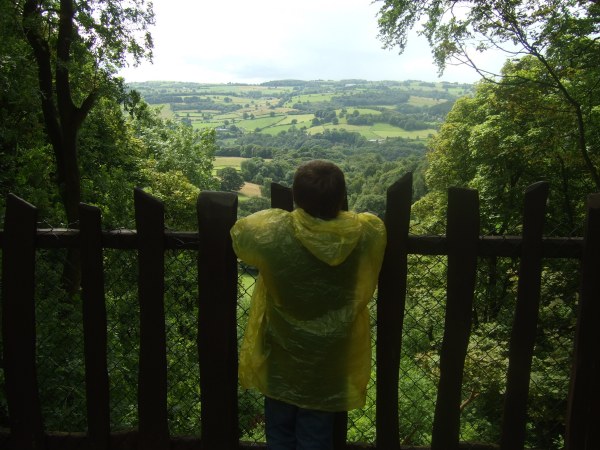
Think, think, think.... what is it - being English or something? Why can't I think of some smart stunts to help promote this book?
27 July 2009
Although I'm English, the Saturday Evening Post is part of my childhood. My Dad used to be stationed in Germany and we used to go to the PX Stores - I think they were called - which was the equivalent of our NAAFI, which sold stuff from "back home" to military staff stationed abroad. One of the things my parents used to buy there (apart from weird American breakfast cereal) was the Post. I used to really enjoy reading it. In fact, we all did.
Now, they've decided to restore fiction to the Post and they're encouraging writers to submit (here are their submission guidelines).
I think that magazines should go much further. There's a whole load of writing talent out there, and so why not run a contest , and the price of entry would be a 3 month subscription to the magazine?
I often just don't think of buying a magazine but when I get it every month I start missing it if it is not there.
I am no marketing genius but it does seem a bit surprising that nobody has done this yet. So it makes me wonder if there is a good reason why not.
Whatever, magazines and newspapers have to do SOMETHING. Everyone wants to write, nobody seems to want to buy, and there's not enough money in online publishing for businessmen to want to invest good money in it.
Now, they've decided to restore fiction to the Post and they're encouraging writers to submit (here are their submission guidelines).
I think that magazines should go much further. There's a whole load of writing talent out there, and so why not run a contest , and the price of entry would be a 3 month subscription to the magazine?
I often just don't think of buying a magazine but when I get it every month I start missing it if it is not there.
I am no marketing genius but it does seem a bit surprising that nobody has done this yet. So it makes me wonder if there is a good reason why not.
Whatever, magazines and newspapers have to do SOMETHING. Everyone wants to write, nobody seems to want to buy, and there's not enough money in online publishing for businessmen to want to invest good money in it.
24 July 2009
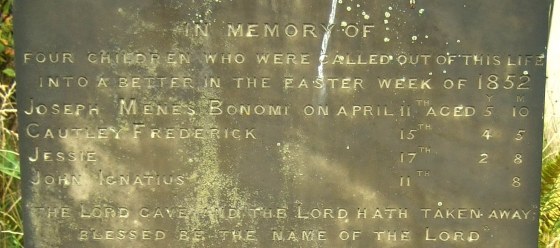
Carroll's parents did really well to raise their eleven children to adulthood. Carroll was the first to die, at the age of 66, in 1898 and he had reached the age of 66. The others all died when they were older.
Cholera and infectious diseases raged during his youth and I have seen letters from his family during his childhood which show how worried they were about cholera. And then yesterday. I saw this tragic tombstone in Brompton cemetery. The children were outlived by their mother for only a few years. Their father was Joseph Bonomi, sculptor, traveller and archaeologist, who was the curator of the Soane Museum for years. He died about twenty five years later.
23 July 2009
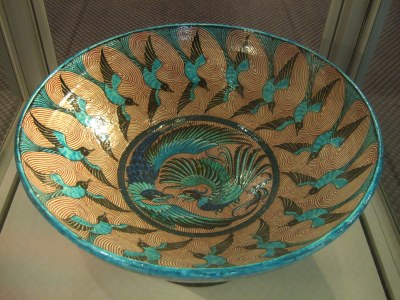
Went to the de Morgan Centre yesterday. It has only been open for a few years, and was beautifully fitted out in a super old building that was given to the local people in 1887. However, I'd made an urgent decision to visit, as I'd heard it was to close at the end of this week, with no definite plans to re-open. The reason? The council wants to get its hands on the building it is in, and has broken its lease. Sounded like shades of the Livesey Museum a scandal which has gone rather quiet.
The Scandal of the Livesey Museum
The Livesey looked after the needs of children in a deprived area, and was unique. Having seen the surroundings of the de Morgan Centre, it seems to me an absolute beacon of elegance and culture in the grotty, dirty, run down dump that is Wandsworth West Hill. Both museums could hardly be needed more as cultural and intellectual oases - as affirmation that life's horizons don't have to be limited by the pub and the bookie's and the Tesco container lorries grinding past.
The Livesey seems to be lying empty, and I can find out nothing further about its prospects. I think the idea was to sell it for housing, before the housing market collapsed. No doubt the business geniuses at Wandsworth's council have similar exciting plans that are worth dismantling a new world-class facility for.
Anyway if you love de Morgan's ceramics, this place is a wonder. He was very interested in Middle Eastern art and developed techniques in lustre ware,
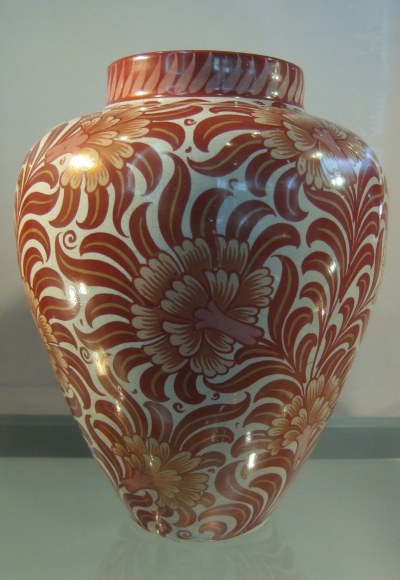
but most of all his pots and tiles are full of life and individuality, with motifs of fish and foliage and birds continuously deployed, yet different each time. Wonderful subtleties of colour in these parrot tiles here.
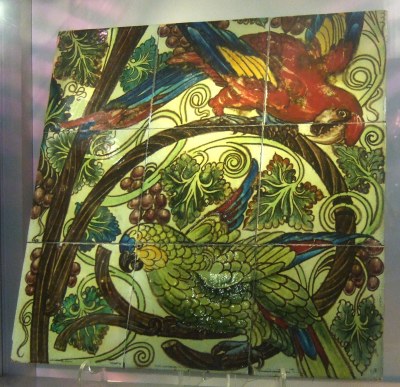
There are also lots of paintings by William's wife, Evelyn, very accomplished and full of a kind of oriental richness, but - dare I say it - they do rather belong to the "Victorians in Fancy Dress" school.
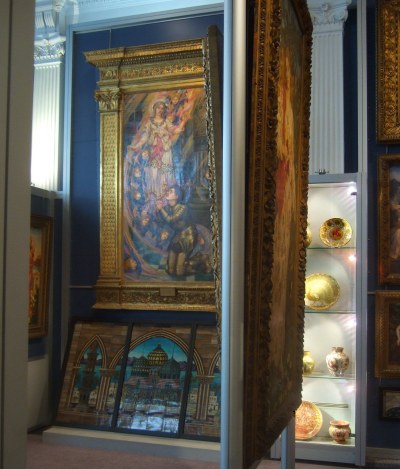
However, they provide a wonderful backdrop to the ceramics.
Lewis Caroll and William de Morgan
Oh, and the Carroll connection. Carroll called on de Morgan to talk about tiles in December 1882. He says no more. In March, 1883, he records, Mr. de Morgan came as his guest for the night at Oxford, and they dined tete-a-tete in Carroll's rooms. In his usual style, Carroll doesn't bother to say any more about him or what they discussed. I wonder if de Morgan kept a diary and if so was any more forthcoming. Carrol then called on de Morgan "before breakfast" at the end of May, to discuss tiles even further.
Nothing further til March 4, 1887, when our hero called on Mr. de Morgan and "chose a set of red tiles for the large fire place". Were these the Hunting of the Snark tiles which his child friends so often remembered? I had always assumed these were specially commissioned, so perhaps Carroll was referring to tiles which he apparently purchased for the Common Room at Christ Church. His bank account shows that he paid de Morgan £52.10 on the 11th December 1886. A very substantial sum - multiply by about fifty to get the current price in pounds.
Carroll sometimes paid for Common Room items out of his own funds, and presumably claimed them back later. He was always willing to spend substantial sums (including money he hadn't actually got) on art so it's not impossible that he paid all that money out of his own pocket just to decorate his fireplace. It would be interesting to know more.
21 July 2009
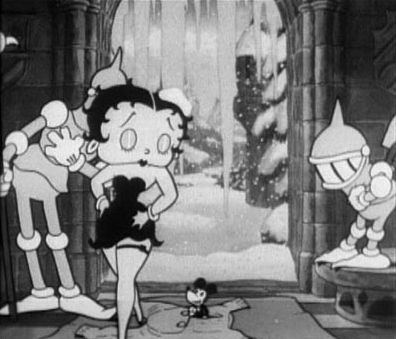
I'm looking for a clip of the Max Fleischer studios animation of "The Walrus and the Carpenter" which was in the 1933 Paramount production of "Alice in Wonderland." The only animated bit of the movie and I wish they'd got Fleischer to animate it all! Nothing to be found on that reliable old favourite Youtube, but I got sidetracked onto more Fleischer movies, notably some of the Betty Boops. My favourites are two with Cab Calloway, Minnie the Moocher, in which Betty runs away from home and is treated to a performance by a ghost dancing like Calloway, and my all-time favourite, "Snow White.". (image above, as Betty enters the castle of her wicked stepmother).
In this the hateful queen gives an echo of Wonderland by shouting "Off with her head!" but the high spot is Cab, alias a creature, singing "St James Infirmary."
I don't know of any animated short makers these days who use the medium of drawn animation as creatively as this, making films full of fantasy and illusion and delusion and energy and emotion. One or more of those elements is always missing.....
19 July 2009
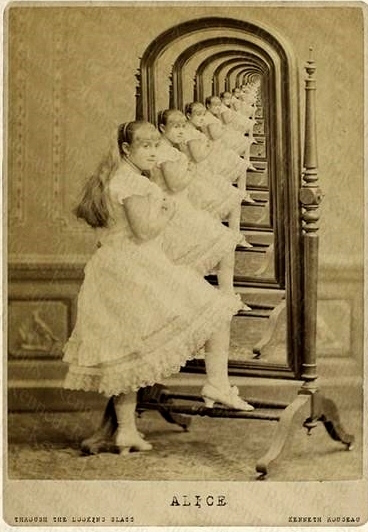
Found Gorey Details - Toys for the Dark Recesses of your Mind, and of course Alice is there in some guises that I have not seen before. This is a card of a decidedly pert Alice showing off her calves and nearly her knees (gasp) in an interesting card. When I was a child I used to love setting up a triple-mirror which my mother had, and watching my chubby little self disappear into infinity.
17 July 2009
Before now I somehow missed Gwen Stefani's promo It's full of Alice references. Wonder who designed it - it's visually brilliant.
Pop Promos - Film Folk Art
Will people look back on the late 20th and early 21st century as a time when the art of short filmmaking is at its height? I think so. There is such a lot of good work out there linking words, music and visual images.
I know the critics don't pay much attention because promos are commercial and therefore limited in their scope, but despite the commercialism they are a kind of folk art of film.
Not made BY the common folk, but made FOR them, to be as appealing as possible. Well anyway, that's my opinion, as a common folksperson.
Pop Promos - Film Folk Art
Will people look back on the late 20th and early 21st century as a time when the art of short filmmaking is at its height? I think so. There is such a lot of good work out there linking words, music and visual images.
I know the critics don't pay much attention because promos are commercial and therefore limited in their scope, but despite the commercialism they are a kind of folk art of film.
Not made BY the common folk, but made FOR them, to be as appealing as possible. Well anyway, that's my opinion, as a common folksperson.
14 July 2009
Elena Verling has written some interesting stuff about Alice as a global brand on her blog, here. I don't know if this is a thesis or a book she's planning, but I've sometimes thought that if Carroll had lived now, and taken a modern marketing approach to his creation, he could have been a millionaire. As it was, he invented a smart little "Alice" postage stamp case, and allowed an "Alice" biscuit tin to be made (and was rather disappointed it had no biscuits in) but other than this I haven't been able to trace any other "Alice" merchandising that he sanctioned.
Alice Liddell, after she grew up, was a bit snooty even about the success that he had had. I think that she probably viewed herself as a cut above him, and didn't like the idea that he might make money out of a story written for her. I've sometimes wondered if that was a class thing, since the Victorian class system did have some very unpleasant aspects. Trying to move out of your designated class often elicited angry responses, both from members of your own class and from members of the class you were trying to move into.
In the case of the Liddells, they seem to have been no higher class than Carroll, even though they had more money, so Alice's comment may have been mere ill temper. Or perhaps it was a general snootiness about anything that may have seemed like "trade" - that is, working for your money instead of inheriting it or marrying into it. Annoying thought, really. Ah well... on a better note, here's a nice picture taken from the window of Carroll's brother's vicarage in Vowchurch, Herefordshire, which is now a very charming b&b. It was taken just as dawn was breaking last March. If I could look at views like this all day I expect I'd be a calmer person
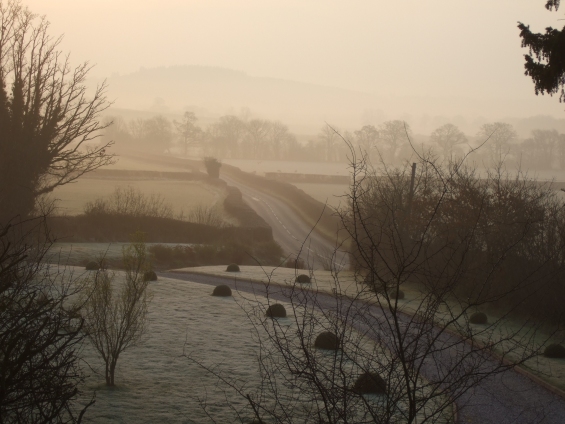
Alice Liddell, after she grew up, was a bit snooty even about the success that he had had. I think that she probably viewed herself as a cut above him, and didn't like the idea that he might make money out of a story written for her. I've sometimes wondered if that was a class thing, since the Victorian class system did have some very unpleasant aspects. Trying to move out of your designated class often elicited angry responses, both from members of your own class and from members of the class you were trying to move into.
In the case of the Liddells, they seem to have been no higher class than Carroll, even though they had more money, so Alice's comment may have been mere ill temper. Or perhaps it was a general snootiness about anything that may have seemed like "trade" - that is, working for your money instead of inheriting it or marrying into it. Annoying thought, really. Ah well... on a better note, here's a nice picture taken from the window of Carroll's brother's vicarage in Vowchurch, Herefordshire, which is now a very charming b&b. It was taken just as dawn was breaking last March. If I could look at views like this all day I expect I'd be a calmer person

13 July 2009
Looks as if I could be writing a magazine article or two about Alice and Carroll this autumn and so I've been checking out Tim Burton's Alice movie and also the Burton retrospective in New York .
The show is looking back over the whole of Burton's career to date, and so "Alice" will only be a part of it. In fact, Ron Magliozzi, who is curating it, tells me that Alice doesn't feature heavily because a lot of the material comes from early on in Burton's career.
Still, it should be interesting, and the movie should be a must too for anyone who loves the "dark" take on "Alice." That doesn't include me but I still can't wait, because I've been taking a look at some images from the movie, courtesy of WIRED, and it looks as if it will be amazingly beautiful and visually fantastic.
I'm always intrigued at the way that some people can see a reassuring fantasy for little children, and others can see a gothic horror story in the "Alice" books. I think it's because Carroll wrote both the "Alice" books to cheer himself up and calm himself down when he was in a state of despair and fear.
Therefore, they give out both messages.
I go into this more in my book, of course.
The show is looking back over the whole of Burton's career to date, and so "Alice" will only be a part of it. In fact, Ron Magliozzi, who is curating it, tells me that Alice doesn't feature heavily because a lot of the material comes from early on in Burton's career.
Still, it should be interesting, and the movie should be a must too for anyone who loves the "dark" take on "Alice." That doesn't include me but I still can't wait, because I've been taking a look at some images from the movie, courtesy of WIRED, and it looks as if it will be amazingly beautiful and visually fantastic.
I'm always intrigued at the way that some people can see a reassuring fantasy for little children, and others can see a gothic horror story in the "Alice" books. I think it's because Carroll wrote both the "Alice" books to cheer himself up and calm himself down when he was in a state of despair and fear.
Therefore, they give out both messages.
I go into this more in my book, of course.
02 July 2009
Sorry if this doesn't read as coherently as usual. I've switched to a different browser and it doesn't mix with my blog format too amiably. The screen is jittering about in a way that feels like bobbing for apples - except that instead of fruits, there are bits of text bobbing madly around all over the place and sliding away when you try to get hold of them.
Anyway, I went on a radio skills course at Whistledown Productions I've often heard their name at the end of excellent programmes on Radio 4 and so when I got the offer of a course it seemed too good a chance to miss.
Speed
As a freelance who is able to set my own hours, I found it most interesting to be working at top speed. In our tightly structured course, were six one-hour slots.
By the end of the day we needed to have done six tasks which were probably easy enough ... but oh ho, it was a very different story when they had to be done at top speed.
Getting Up Close to SADiE
We were in groups of three people. Our group began by learning to use the SADiE editing system to assemble the components of a programme on three channels. All the sections had already been prepared, and we had to organise the material, label it, add the sound effects and music in appropriate places and splice the sections together. The clue to the problem is that we had to learn how to use the editing software in that time, too. I expect it would have been easier for a group of 10 year olds than a group of ageing writers like us.
Fifteen Minutes at the Market
Next, we had to put together a short - 4 minute - piece for a radio magazine programme about the local market. Off to the market hall, listening to a briefing and instructions, then taking just fifteen minues to find people to interview, interviewing them, doing an intro and conclusion and getting some sound effects.
I did this all right, thanks to a man who could talk for England about olives. He was great but nonetheless I didn't create the most fascinating piece in the world out of it (unless you're obsessed with antipasti) but I thought I'd done well to do it at all. So imagine how struck with admiration I was for one of our group members who actually managed to give her piece a theme - the multi national character of the market - in that fifteen minutes. Her piece sounded like a proper bit of radio.
Never Say You Don't Know
Then the experience of being interviewed. We had one friendly and one hostile interviewer - actually it was the same man, David Prest, who has won a couple of Sony Gold Awards and is MD of Whistledown.
Before we went into the studio, we made a list of the key points we wanted to make during the interview - to focus the mind, really, I suppose - and considered some useful advice about how to handle potential problems. The sort of thing that will ring a bell with all those who fume and rage when listening to politicians being interviewed on the radio.
Never say you don't know something, don't get involved in speculation: you must, if some horrendous question is sprung on you, learn to evade the question. Yes, you know the kind of stuff. It turns out that time is so tight on radio that this is probably the only way, since it really is impossible to start developing complicated arguments. Still annoying to listen to, though.
Riots in Budapest
One of our group, Adrian, was interviewed about Budapest, on which he had just written a guidebook. Hostile David gradually introduced more and more spurious terror reports that were supposedly coming in about Budapest. Adrian handled it very well: "I can't comment because I don't know the facts" he said in various ways, during seven attempts to break him down. Finally David yelled "The Foreign Office have said nobody should travel to Budapest unless it is strictly necessary!" To which Adrian smilingly replied that he would always urge anyone to follow safety advice but he still couldn't comment. That interview got a round of applause when it was played back.
Carroll and Michael Jackson
I opted to be interviewed about Carroll. The chat with Friendly David went well and I realised how important it is to have an good interviewer who is in control. Hostile David insisted on dwelling on the death of Michael Jackson and inviting me to make parallels between Carroll and Jackson.
I hadn't been able to prepare for it- you never can prepare for people firing deliberately difficult questions at you. It helps of course that I don't see Carroll as a sort of Victorian predecessor of Michael Jackson, and so I ended up feeling that I had dealt with it well.
Pitching Radio Programme Ideas
Realising I'd been okay on the hostile interview quite set me up for the tasks of the afternoon - a stint doing live interviewing, a programme pitching session and the task of assembling our efforts in the market hall into a coherent item. Of these, the most interesting was the pitching. We devised programme ideas in our groups, and hearing these ideas taken apart in the subsequent discussion made it very clear what programme makers are looking for - something you can't somehow pick up from the BBC guidelines.
And More...
Part 2 follows in the next post, which I've put to appear AFTER this one, with the magic of technology, even though it was written a couple of days later..
Anyway, I went on a radio skills course at Whistledown Productions I've often heard their name at the end of excellent programmes on Radio 4 and so when I got the offer of a course it seemed too good a chance to miss.
Speed
As a freelance who is able to set my own hours, I found it most interesting to be working at top speed. In our tightly structured course, were six one-hour slots.
By the end of the day we needed to have done six tasks which were probably easy enough ... but oh ho, it was a very different story when they had to be done at top speed.
Getting Up Close to SADiE
We were in groups of three people. Our group began by learning to use the SADiE editing system to assemble the components of a programme on three channels. All the sections had already been prepared, and we had to organise the material, label it, add the sound effects and music in appropriate places and splice the sections together. The clue to the problem is that we had to learn how to use the editing software in that time, too. I expect it would have been easier for a group of 10 year olds than a group of ageing writers like us.
Fifteen Minutes at the Market
Next, we had to put together a short - 4 minute - piece for a radio magazine programme about the local market. Off to the market hall, listening to a briefing and instructions, then taking just fifteen minues to find people to interview, interviewing them, doing an intro and conclusion and getting some sound effects.
I did this all right, thanks to a man who could talk for England about olives. He was great but nonetheless I didn't create the most fascinating piece in the world out of it (unless you're obsessed with antipasti) but I thought I'd done well to do it at all. So imagine how struck with admiration I was for one of our group members who actually managed to give her piece a theme - the multi national character of the market - in that fifteen minutes. Her piece sounded like a proper bit of radio.
Never Say You Don't Know
Then the experience of being interviewed. We had one friendly and one hostile interviewer - actually it was the same man, David Prest, who has won a couple of Sony Gold Awards and is MD of Whistledown.
Before we went into the studio, we made a list of the key points we wanted to make during the interview - to focus the mind, really, I suppose - and considered some useful advice about how to handle potential problems. The sort of thing that will ring a bell with all those who fume and rage when listening to politicians being interviewed on the radio.
Never say you don't know something, don't get involved in speculation: you must, if some horrendous question is sprung on you, learn to evade the question. Yes, you know the kind of stuff. It turns out that time is so tight on radio that this is probably the only way, since it really is impossible to start developing complicated arguments. Still annoying to listen to, though.
Riots in Budapest
One of our group, Adrian, was interviewed about Budapest, on which he had just written a guidebook. Hostile David gradually introduced more and more spurious terror reports that were supposedly coming in about Budapest. Adrian handled it very well: "I can't comment because I don't know the facts" he said in various ways, during seven attempts to break him down. Finally David yelled "The Foreign Office have said nobody should travel to Budapest unless it is strictly necessary!" To which Adrian smilingly replied that he would always urge anyone to follow safety advice but he still couldn't comment. That interview got a round of applause when it was played back.
Carroll and Michael Jackson
I opted to be interviewed about Carroll. The chat with Friendly David went well and I realised how important it is to have an good interviewer who is in control. Hostile David insisted on dwelling on the death of Michael Jackson and inviting me to make parallels between Carroll and Jackson.
I hadn't been able to prepare for it- you never can prepare for people firing deliberately difficult questions at you. It helps of course that I don't see Carroll as a sort of Victorian predecessor of Michael Jackson, and so I ended up feeling that I had dealt with it well.
Pitching Radio Programme Ideas
Realising I'd been okay on the hostile interview quite set me up for the tasks of the afternoon - a stint doing live interviewing, a programme pitching session and the task of assembling our efforts in the market hall into a coherent item. Of these, the most interesting was the pitching. We devised programme ideas in our groups, and hearing these ideas taken apart in the subsequent discussion made it very clear what programme makers are looking for - something you can't somehow pick up from the BBC guidelines.
And More...
Part 2 follows in the next post, which I've put to appear AFTER this one, with the magic of technology, even though it was written a couple of days later..
01 July 2009
And in the afternoon at the radio course.... well, the next step was to assemble our clips from Borough Market into a recognisable programme insert.
Editing A Radio Programme
"Make sure you separate and label all the bits" chirped our tutor - so I had to try and remember how to do that, and play through the "takes" I'd done to find out which was the best, and cut out all the idiotic burbling rubbish which WASN'T right. As for forming it into a programme that was actually interesting - well, come on guys. At least it ended up with a beginning, middle and end.
How (Not) To Host An Interview
Then a quick switch to hosting an interview. We had to meet a real author who had written a real book, and interview him for a 4 minute insert into a magazine programme. In order to find out what his book was about, we had to read and absorb 2 pages of information, and, of course look through the book. We were told that he'd already been interviewed many times before, and urged to get some interesting material out of him. "Jot a quick reminder but don't write anything down" we were advised. "It's never good to be reading out questions on air." About five questions would do it, we were advised.
Alas, I really fell flat on this one, although it showed me that the cliche that the interviewers don't read your book is true. You'd better be grateful if they read the press release. I prepared five questions but hadn't reckoned on my interviewee, Simon, deciding to hold forth and cover some of the questions I'd prepared. So when he finally fell silent, I didn't know what to say.
Recovering From A Fluff or Dry
The crucial point is to recover yourself quickly. "One good question that always works is, 'So, tell me what the magic of the subject is for you'" advised David - who is a fantastic interviewer, of course. Unfortunately the advice came too late. I was left sweating in the interviewer's chair, not having read the book, having forgotten the press release, and having run out of questions. Not fun. Still, I did recover. I mean, I said something. When I get the CD, I'll discover what it was.
Pitching Radio Programme Ideas
The final session was putting together programme idease. I'd like to write more about that, but you know this screen has started jumping about again so I'm going to leave it for another time.
Editing A Radio Programme
"Make sure you separate and label all the bits" chirped our tutor - so I had to try and remember how to do that, and play through the "takes" I'd done to find out which was the best, and cut out all the idiotic burbling rubbish which WASN'T right. As for forming it into a programme that was actually interesting - well, come on guys. At least it ended up with a beginning, middle and end.
How (Not) To Host An Interview
Then a quick switch to hosting an interview. We had to meet a real author who had written a real book, and interview him for a 4 minute insert into a magazine programme. In order to find out what his book was about, we had to read and absorb 2 pages of information, and, of course look through the book. We were told that he'd already been interviewed many times before, and urged to get some interesting material out of him. "Jot a quick reminder but don't write anything down" we were advised. "It's never good to be reading out questions on air." About five questions would do it, we were advised.
Alas, I really fell flat on this one, although it showed me that the cliche that the interviewers don't read your book is true. You'd better be grateful if they read the press release. I prepared five questions but hadn't reckoned on my interviewee, Simon, deciding to hold forth and cover some of the questions I'd prepared. So when he finally fell silent, I didn't know what to say.
Recovering From A Fluff or Dry
The crucial point is to recover yourself quickly. "One good question that always works is, 'So, tell me what the magic of the subject is for you'" advised David - who is a fantastic interviewer, of course. Unfortunately the advice came too late. I was left sweating in the interviewer's chair, not having read the book, having forgotten the press release, and having run out of questions. Not fun. Still, I did recover. I mean, I said something. When I get the CD, I'll discover what it was.
Pitching Radio Programme Ideas
The final session was putting together programme idease. I'd like to write more about that, but you know this screen has started jumping about again so I'm going to leave it for another time.
